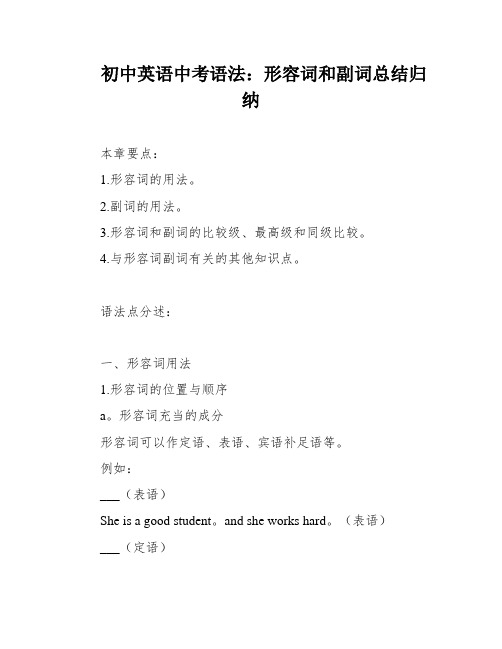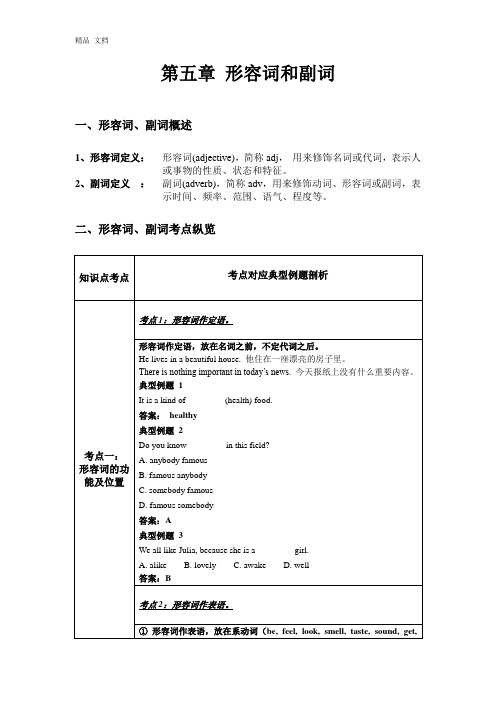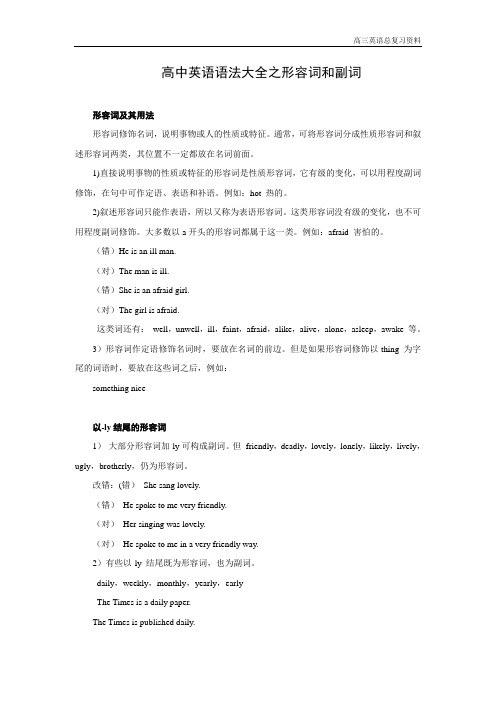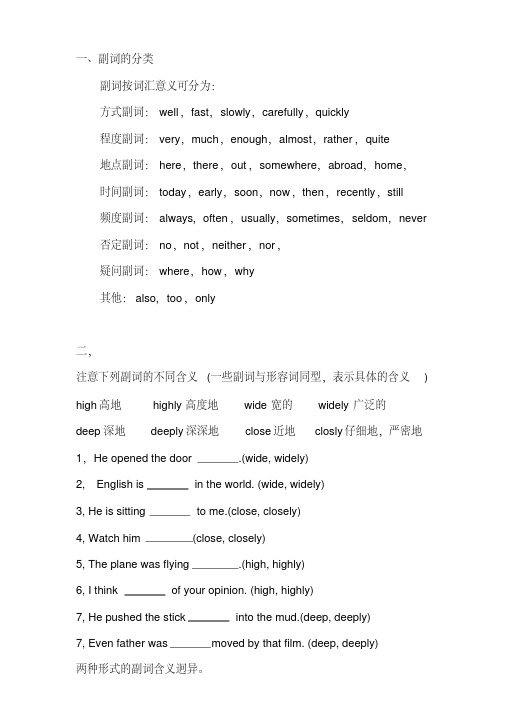总结与形容词同形副词
初中英语中考语法:形容词和副词总结归纳

初中英语中考语法:形容词和副词总结归纳本章要点:1.形容词的用法。
2.副词的用法。
3.形容词和副词的比较级、最高级和同级比较。
4.与形容词副词有关的其他知识点。
语法点分述:一、形容词用法1.形容词的位置与顺序a。
形容词充当的成分形容词可以作定语、表语、宾语补足语等。
例如:___(表语)She is a good student。
and she works hard。
(表语)___(定语)b。
形容词的顺序形容词的顺序为:限定词、外观(大小、长短和高低)、形状、年龄(新旧)、材料、颜色、国籍。
主观在前,客观在后。
例如:一件昂贵的俄国产的棕色皮大衣一条可爱的丹麦的小美人鱼One day they crossed the old Chinese ___.一根爷爷传给我的长长的棕色的波斯木纹手杖a。
特殊形容词的位置特殊形容词修饰不定代词时放在后面。
例如:I had ___ that there would be nothing us because it was fairly common for an old man to catch illness。
(fairly为特殊形容词)well、ill等表达健康状况、情感类形容词只作表语,不做定语。
例如:He is an ill man.(定语)He is ___.(表语)二、副词用法副词可以修饰动词、形容词、副词和整个句子。
例如:___(修饰动词)___(修饰形容词)___(修饰副词)Fortunately。
___(修饰整个句子)三、形容词和副词的比较级、最高级和同级比较形容词和副词的比较级通常在词尾加-er,最高级通常在词尾加-est。
例如:fast。
faster。
fastestbeautiful。
more beautiful。
most beautiful同级比较则使用as…as结构。
例如:She is as smart as her sister.四、与形容词副词有关的其他知识点其他知识点包括:形容词的转化、副词的修饰范围等。
初一英语形容词和副词语法知识总结(讲解+考点+综合练习):形容词和副词

第五章形容词和副词一、形容词、副词概述1、形容词定义:形容词(adjective),简称adj,用来修饰名词或代词,表示人或事物的性质、状态和特征。
2、副词定义:副词(adverb),简称adv,用来修饰动词、形容词或副词,表示时间、频率、范围、语气、程度等。
二、形容词、副词考点纵览三、综合练习( )1. –If you don’t like the red coat, how about the green one?–OK, but do you have _______ size in green? This one is a bit small for me.A. a bigB. a biggerC. the bigD. the bigger( )2. –Mum, I think I’m _______ to get back to school.–Not really, my dear. You’d better stay at home for anoth er day or two.A. so wellB. so goodC. well enoughD. good enough ( )3. –What delicious cakes! –They will taste _______ with butter.A. goodB. betterC. badD. worse( )4. –Mr. Zhou , of all the students in our group, who lives _______ ?–I think Li Lei does.A. farB. fartherC. farthestD. the farther( )5. With a history of more than 1,400 years, ZhaoZhou Bridge is the _______ stone arch bridge in the world .A. oldB. olderC. oldestD. elder( )6. Bob never does him homework _______ Mary. He makes lots of mistakes.A. so careful asB. as carefully asC. carefully asD. as careful as ( )7. A: How can I speak English _______ you?B: You’d better speak more, I think.A. as good asB. more thanC. as well asD. as much as( )8. Your English is good. I’ll try my best to speak it as _______you do.A. clearly asB. clear asC. clearer thanD. more clearly ( )9. –Is your mother badly ill?–No, _______ , only a little cold.A. serious anythingB. serious nothingC. nothing seriousD. anything serious( )10. I’m not sure if I’m going to Tim’s party; I may go to the concert _______ .A. onlyB. insteadC. earlyD. late( )11. Although they are brothers, they are the _______ opposite of one another.A. veryB. justC. fewD. little( )12. The new Bright Restaurant is _______ than the old one. Moore and more people like to eat there.A. goodB. betterC. badD. worse( )13. Wang Ping does _______ in physics that I missed the first class.A. badlyB. Most badlyC. worseD. worst( )14. I got up so _______ this morning that I missed the first class.A. earlyB. lateC. quietlyD. neatly( )15. –Do you enjoy traveling by plane?–No. It’s _______ expensive.A. much moreB. more muchC. too muchD. much too( )16. I’m afraid the headmaster is _______ busy to meet the visitors.A. too muchB. much tooC. so muchD. much too( )17. How beautifully she sings! I’ve never heard _______ .A. the better voiceB. a good voiceC. the best voiceD. a better voice( )18. You do well in your lessons. I’m _______ you will pass the exam.A. sureB. afraidC. sadD. sorry( )19. –Who is _______ in your class?–Fred.A. tallB. tallerC. tallestD. the tallest( )20. –What do you think of the football match?–Wonderful! The Chinese football team has never played _______ .A. betterB. bestC. worseD. worst( )21. The population of China is _____ than _____ of any other country in the world.A. larger , the oneB. more , thatC. larger , thatD. more , the one ( )22. There is much wine here, but _______ people want to drink it.A. manyB. a littleC. fewD. a few( )23. People speak ______ of the film Not One Less. It is really necessary for every child to go to school.A. loudB. loudlyC. highD. highly( )24. She always finishes her homework on time. She ______ leaves it for tomorrow.A. alwaysB. neverC. usuallyD. sometimes( )25. The football match was _______, so the boys were _______ about it.A. excited , excitingB. exciting, excitedC. excited , excitedD. exciting , exciting( )26. Playing table tennis isn’t difficult. You can learn it _______.A. easyB. easilyC. quickD. hardly( )27. We Chinese always put our family name _______.A. lastB. nearlyC. firstD. in the middle ( )28. This kind of T-shirt look _______ and sells _______ in the market.A. nice, goodB. well , wellC. nice , wellD. good , nice( )29. The light in the room wasn’t _______ for me to read.A. brightly enoughB. enough brightlyC. enough brightD. bright enough( )30. –Look, this digital camera is really cheap! It’s only five hundred yuan.–The _______ , the better. I’m short _______ money, you know.A. cheaper , ofB. cheap, forC. expensive , ofD. more expensive , for( )31. Which subject do you like _______ , math, Chinese or English?A. betterB. bestC. wellD. very much( )32. _______ little water is not enough for _______ many people.A. Such , soB. So , soC. Such , suchD. So , such( )33. English is spoken by _______ people.A. a lotB. much manyC. a large number ofD. a great deal of ( )34. –Isn’t that Mary?–Yes, she always has a(an) _______ smile on her face.A. aloneB. kindlyC. ownD. friendly( )35. –Do you prefer music to drawing?–No. I like drawing _______.A. wellB. mostC. betterD. best( )36. Since China has been a member of the WTO, English is ______ useful than before.A. moreB. mostC. muchD. very( )37. Can you speak a little louder? I can _______ hear you.A. hardB. reallyC. hardlyD. clearly( )38. China has a _______ population and long history.A. manyB. largeC. muchD. big( )39. Do you have _______ to say?A. important anythingB. anything importantC. important somethingD. something important( )40. Which is _______ , English or Chinese?A. interestingB. interestingerC. more interestingD. most interesting( )41. –The TV programme is boring. Shall we play chess intead?–All right. That is _______ than watching a boring programme.A. very goodB. much goodC. very betterD. much better( )42. –Mum, could you buy me a dress like this?–Certainly, we can buy _______ one than this, but _______ this.A. a better, better thanB. a worse , as good asC. a cheaper , as good asD. a more important , not as good as ( )43. Let’s enjoy the song Yesterday Once More. It sounds _______.A. wellB. sadlyC. niceD. bad( )44. –Is the physics problem _______ ?–Yes. I can work it out _______.A. easy , easilyB. easy, easyC. easily , easyD. easily , easily ( )45. Hainan is a very large island. It’s the second _______ island in China.A. largeB. largerC. largerD. most large( )46. What a _______ cough! You seem _______ ill.A. terrible, terriblyB. terribly , terribleC. terrible , terribleD. terribly , terribly ( )47. I’m not sure whether Mary can sing _______ Mabel.A. as well asB. as good asC. so good asD. as better as( )48. Chinese is _______ more difficult than English.A. mostB. veryC. manyD. much( )49. The _______ old man told his son to be a good boy.A. diedB. deadC. dyingD. death( )50. Today my sister is feeling _______ to go to the factory.A. enough goodB. good enoughC. well enoughD. enough well参考答案精品文档1—5 B C B C C6—10 B C A C B11—15 A B D B D16—20 B D A D A21—25 C C D B B26—30 B C C D A31—35 B B C D C36—40 A C B B C文档说明(Word文档可以删除编辑)专注于精品文档:中考、高考、数学语文英语试卷、高中复习题目、小学试卷教案合同协议施工组织设计、期中、期末等测试,本文档目的是为了节省读者的工作时间,提高读者的工作效率,读者可以放心下载文档进行编辑使用.文档来源网络改编,审核有可能疏忽,如果有错误或侵权,请联系本店马上删除。
总结与形容词同形的副词

总结与形容词同形的副词以及英语-ly副词与其同源副词的用法有些副词有两种形式:一是与形容词同形;另外一种呢,还加了一个-ly尾巴。
你知道它们的差别吗?它们或小或大,足以在考试中把你弄得晕头转向。
1. clean and cleanly副词clean完全不是“干净的”的意思,而是“径直地,完全地”意思。
The bulletwent clean through his arm. 子弹完全穿过了他的胳膊。
I clean forgotabout it. 我完全把这个事情忘了。
(这里也可以翻成“我把这个事情忘得干干净净了”。
看来中文和英文还是有共通之处啊!)That knife doesn’t cut clean. 那把小刀切起来不利落。
而cleanl y就是“清洁地”意思啦。
The desk was cleanly filed. 桌子被整理得干干净净。
2. clear and clearly副词clear的意思和cl ean的意思一样,是“完全地,径直地”意思。
You see me clear. 你很透彻地看穿我。
He disappe ared clear away after the crime. 他犯罪后消失得无影无踪。
clear还可以解释为“隔离,不接触”的意思。
Stand clear of the gate. 别靠近门。
You shouldkeep clear of that stupidguy. 你应该离那个蠢家伙远一点。
当然啦,当要表达诸如“清楚地”“明显地”意思的时候,你就放心大胆地用clearly吧。
Can you see it clearly? 你看得清楚吗?He is clearly wrong. 他明显错了。
有两个句子你要牢牢记住,clear和c l early都可以:The moon shone clearly / clear. 月光明媚。
那些和形容词同形的副词

那些和形容词同形的副词有些副词有两种形式:一是与形容词同形;另外一种呢,还加了一个-ly尾巴。
你知道它们的差别吗?它们或小或大,足以在考试中把你弄得晕头转向。
1. clean and cleanly副词clean完全不是“干净的”的意思,而是“径直地,完全地”意思。
The bullet went clean through his arm. 子弹完全穿过了他的胳膊。
I clean forgot about it. 我完全把这个事情忘了。
(这里也可以翻成“我把这个事情忘得干干净净了”。
看来中文和英文还是有共通之处啊!)That knife doesn’t cut clean. 那把小刀切起来不利落。
而cleanly就是“清洁地”意思啦。
The desk was cleanly filed. 桌子被整理得干干净净。
2. clear and clearly副词clear的意思和clean的意思一样,是“完全地,径直地”意思。
You see me clear. 你很透彻地看穿我。
He disappeared clear away after the crime. 他犯罪后消失得无影无踪。
clear还可以解释为“隔离,不接触”的意思。
Stand clear of the gate. 别靠近门。
You should keep clear of that stupid guy. 你应该离那个蠢家伙远一点。
当然啦,当要表达诸如“清楚地”“明显地”意思的时候,你就放心大胆地用clearly 吧。
Can you see it clearly? 你看得清楚吗?He is clearly wrong. 他明显错了。
有两个句子你要牢牢记住,clear和clearly都可以:The moon shone clearly / clear. 月光明媚。
He spoke clearly / clear and loudly / loud. 他说话清晰明朗。
词类活用知识点总结

词类活用知识点总结在语法中,词类活用是指词汇的不同形式在句子中所扮演的不同角色。
在英语中,存在名词、动词、形容词、副词、代词、连词和介词等不同的词类,它们在句子中扮演不同的语法角色。
以下是词类活用的知识点总结:名词名词是指人、事、物、地点和概念的名称。
在句子中,名词可以担任主语、宾语、表语和定语等不同的语法位置。
名词的单数和复数形式、所有格形式以及不同的分类形式都是名词的活用形式。
动词动词是表示动作、状态或者变化的词汇,它在句子中可以担任谓语、宾语补足语等不同的语法位置。
动词的时态、语态、语气、人称和数等形式都是动词的活用形式。
形容词形容词是表示人或事物的性质、特征或状态的词汇,它在句子中可以作为定语、表语等不同的语法位置。
形容词的比较级和最高级形式是形容词的活用形式,它们用来表示事物之间的程度或者比较。
副词副词是修饰动词、形容词、副词或整个句子的词汇,它在句子中可以作状语、宾补等不同的语法位置。
副词的比较级和最高级形式是副词的活用形式,它们用来表示程度或者比较。
代词代词是用来代替名词或者名词短语的词汇,它在句子中可以作主语、宾语、表语等不同的语法位置。
代词的人称、数和格等形式是代词的活用形式,它们用来表示代词在句子中的不同角色。
连词连词是用来连接词、词组或句子的词汇,它在句子中起连接作用。
连词的不同种类和用法是它的活用形式,它们用来表示逻辑关系和语法连接。
介词介词是用来表示事物之间的关系或位置的词汇,它在句子中可以作状语、宾语等不同的语法位置。
介词的不同种类和用法是它的活用形式,它们用来表示不同的空间或时间关系。
总结词类活用是语法中非常重要的知识点,它涉及到词汇的不同形式在句子中所扮演的不同角色。
掌握词类活用的知识能够帮助我们正确理解句子的结构和含义,提高我们的语言表达能力。
因此,我们在学习和使用语言的过程中,要注重词类活用的练习和应用,从而提高我们对语言的认知和运用能力。
高中英语语法总结大全之形容词和副词

高中英语语法大全之形容词和副词形容词及其用法形容词修饰名词,说明事物或人的性质或特征。
通常,可将形容词分成性质形容词和叙述形容词两类,其位置不一定都放在名词前面。
1)直接说明事物的性质或特征的形容词是性质形容词,它有级的变化,可以用程度副词修饰,在句中可作定语、表语和补语。
例如:hot 热的。
2)叙述形容词只能作表语,所以又称为表语形容词。
这类形容词没有级的变化,也不可用程度副词修饰。
大多数以a开头的形容词都属于这一类。
例如:afraid 害怕的。
(错)He is an ill man.(对)The man is ill.(错)She is an afraid girl.(对)The girl is afraid.这类词还有:well,unwell,ill,faint,afraid,alike,alive,alone,asleep,awake 等。
3)形容词作定语修饰名词时,要放在名词的前边。
但是如果形容词修饰以-thing为字尾的词语时,要放在这些词之后,例如:something nice以-ly结尾的形容词1)大部分形容词加-ly可构成副词。
但friendly,deadly,lovely,lonely,likely,lively,ugly,brotherly,仍为形容词。
改错:(错)She sang lovely.(错)He spoke to me very friendly.(对)Her singing was lovely.(对)He spoke to me in a very friendly way.2)有些以-ly 结尾既为形容词,也为副词。
daily,weekly,monthly,yearly,earlyThe Times is a daily paper.The Times is published daily.用形容词表示类别和整体1)某些形容词加上定冠词可以泛指一类人,与谓语动词的复数连接。
六年级形副相同的词和以ly结尾的形容词

六年级形副相同的词和以ly结尾的形容词一、常见的形副同行的副词有二类:1. 意义差别很大的,比如:(1)hard 努力地、费力地、大量地;hardly 几乎不(2)near 近地;nearly 几乎,差不多(3)just 刚刚、仅仅;justly 公正地(4)late 迟地、晚地;lately 最近(5)free 免费;freely 自由地(6)pretty 相当、十分;prettily 漂亮地(7)sharp准时;sharply突然、急剧地、严厉地(8)fair公平地;fairly相当地(9)most最、非常;mostly 多数(10)even甚至;evenly平均地(11)dead完全、非常;deadly死一般地(12)right 正好、恰好、完全、直接地;rightly 正确地、恰当地2. 意义差别不大的,可从二个方面来区别使用:一般来说,与形容词同形的副词表具体意义;而-ly副词表抽象意义。
如:(1)wide 宽地;widely 广泛地(2)high 高地;highly 高度地;(3)deep深地;deeply深深地、很、非常(4)short简短地;shortly 不久、立刻(5)direct径直地;directly直接、坦率地(6)close近地;closely密切地、仔细地二、以ly结尾的形容词(1)lovely 可爱的;(2)lonely 孤独的;(3)costly 昂贵的,代价高的;(4)friendly 友好的;(5)daily 每日的;(6)weekly 每周的;(7)monthly 每月的;(8)quarterly 每季度的;(9)yearly 每年的/年度的;(10)deadly 致命的;(11)silly 愚蠢的,冒傻气的;(12)orderly 有秩序的,整齐的;(13)manly 有男子汉气概的;(14)lively 活跃热情的/热烈的/活泼的;(15)fatherly 慈父般的;(16)ugly 丑陋的/丑恶的;(17)likely(可能的)(18)brotherly(兄弟般的)(19)timely(及时的)(20)motherly(慈母般的)(21)early (早的/早期的)值得注意的是,以上单词中,orderly, lovely, lively, friendly, ugly, timely, fatherly, brotherly, lonely, costly, silly, manly, motherly只能用做形容词,而其他词既能用做形容词,也能用做副词。
(完整版)初中英语副词总结归纳大全

一、副词的分类副词按词汇意义可分为:方式副词:well,fast,slowly,carefully,quickly程度副词:very,much,enough,almost,rather,quite地点副词:here,there,out,somewhere,abroad,home,时间副词:today,early,soon,now,then,recently,still频度副词:always,often,usually,sometimes,seldom,never 否定副词:no,not,neither,nor,疑问副词:where,how,why其他:also,too,only二,注意下列副词的不同含义(一些副词与形容词同型,表示具体的含义) high高地highly高度地wide宽的widely广泛的deep深地deeply深深地close近地closly仔细地,严密地1,He opened the door .(wide, widely)2, English is in the world. (wide, widely)3, He is sitting to me.(close, closely)4, Watch him (close, closely)5, The plane was flying .(high, highly)6, I think of your opinion. (high, highly)7, He pushed the stick into the mud.(deep, deeply)7, Even father was moved by that film. (deep, deeply)两种形式的副词含义迥异。
late迟,晚lately最近hard努力的,艰苦地hardly几乎不just刚刚,仅仅,恰好justly公正地,正当地most很,最mostly主要地almost几乎,差不多三,其它副词比较:1, already与yet的区别already用于肯定句句中,表示“已经”;yet用于否定句句末,表示“还”,用于疑问句句末,表示“已经”例如,He had already left when I called.当我给他打电话时,他已经离开了。
- 1、下载文档前请自行甄别文档内容的完整性,平台不提供额外的编辑、内容补充、找答案等附加服务。
- 2、"仅部分预览"的文档,不可在线预览部分如存在完整性等问题,可反馈申请退款(可完整预览的文档不适用该条件!)。
- 3、如文档侵犯您的权益,请联系客服反馈,我们会尽快为您处理(人工客服工作时间:9:00-18:30)。
总结与形容词同形的副词以及英语-ly副词与其同源副词的用法有些副词有两种形式:一是与形容词同形;另外一种呢,还加了一个-ly尾巴。
你知道它们的差别吗?它们或小或大,足以在考试中把你弄得晕头转向。
1. clean and cleanly副词clean完全不是“干净的”的意思,而是“径直地,完全地”意思。
The bullet went clean through his arm. 子弹完全穿过了他的胳膊。
I clean forgot about it. 我完全把这个事情忘了。
(这里也可以翻成“我把这个事情忘得干干净净了”。
看来中文和英文还是有共通之处啊!)That knife doesn’t cut clean. 那把小刀切起来不利落。
而cleanly就是“清洁地”意思啦。
The desk was cleanly filed. 桌子被整理得干干净净。
2. clear and clearly副词clear的意思和clean的意思一样,是“完全地,径直地”意思。
You see me clear. 你很透彻地看穿我。
He disappeared clear away after the crime. 他犯罪后消失得无影无踪。
clear还可以解释为“隔离,不接触”的意思。
Stand clear of the gate. 别靠近门。
You should keep clear of that stupid guy. 你应该离那个蠢家伙远一点。
当然啦,当要表达诸如“清楚地”“明显地”意思的时候,你就放心大胆地用clearly 吧。
Can you see it clearly? 你看得清楚吗?He is clearly wrong. 他明显错了。
有两个句子你要牢牢记住,clear和clearly都可以:The moon shone clearly / clear. 月光明媚。
He spoke clearly / clear and loudly / loud. 他说话清晰明朗。
3. close and closely都听过莫文蔚的Close To You这首歌吧?那为什么不是Closely To You?就让我来解释一下这两个词的区别吧!副词close修饰具体的事物,表示“接近地”意思。
He lives close to the school. 他住得离学校很近。
当修饰抽象的事物,表示“接近地”、“严密地”、“仔细地”的时候,就放心大胆地用closely吧!Watch what I do closely! 仔细看我怎么做的!4. direct and directly副词direct作“直线地,不绕圈子地”解。
The train goes there direct. 火车直接开到那儿。
The next flight doesn’t go direct to Rome. 飞机不直达罗马。
He came direct to London. 他直接到了伦敦。
而directly作“直接地”的解。
Answer my question directly! 直接回答我的问题!She told me very directly and openly. 她直截了当地告诉我了。
directly还有“立即”和“马上”的意思。
I will be there directly. 我马上就到。
He should be here directly if you don’t mind waiting. 如果您不介意等等,他马上就到。
5. easy and easilyeasy作副词的时候只出现在固定搭配中。
Take it easy. 别着急,慢慢来。
Go easy. 别着急。
Easy come, easy go. 好来好散。
Stand easy! 稍息!除此之外,都用easily。
I finished it easily. 我一下子就搞定了。
He is not easily satisfied. 他不容易满足。
6. firm and firmlyfirm作副词用时,只出现在以下的固定搭配中:Stand firm. 站稳了啊。
Always hold firm to what you believe. 坚持你所信仰的东西。
7. high and highlyhigh用作副词用的时候也只出现在以下几种情况中,你牢牢记住就好!aim high力争上游hold one’s head high骄傲play high大赌注search high and low到处寻找run high激动fly high有雄心highly通常是抽象的“高”的意思。
He spoke highly of her. 他大大赞美她。
He paid highly for his stupid behaviors. 他为他做的蠢事付出了很高的代价。
8. right and rightly这两个词语当表示“对”的意思的时候都可以修饰动词,但是rightly通常放在动词之前。
你可以看看下面的句子。
He rightly guessed that you were not going there.He guessed right that you were not going there. 他猜对了,你不会去。
If I remember right, you were my high school classmate. 如果我记得没错的话,你是我的高中同学。
If I’m rightly informed, I should be there right away. 如果消息没错的话,我得马上去。
9. sharp and sharply这两个词都可当作“急剧地”意思解。
At the crossroads, we turned sharp to the left. 我们在十字路口突然来了个左转。
The road turns very sharply. 道路起伏不平。
另sharp作副词时表达“准时”或“仓猝”的意思,多半修饰时间、方向和音符;sharply 则是“刻薄”或“尖刻”的意思,多半修饰行动和说话。
The violins were playing sharp.小提琴能演奏高音。
Don’t speak too sharply to them,please.请不要对他们说话过于尖刻了。
10. slow and slowlyslow作副词用的时候仅仅能用于go slow这样的搭配。
其他情况都用slowly。
The workers decided to go slow. 工人们决定怠工一会儿。
Speak slowly, please. 拜托您说慢点儿。
Drive slowly when you are crossing the road. 过那条马路的时候开慢点儿。
练习一下下面有几道测试题,如果你还拿不到满分,那就再多看看这篇文章吧!Sorry I didn’t turn up —I _____ forgot. (clean, cleanly)I’m afraid I’m _____ out of food. (clean, cleanly)This pen writes _____ . (clean, cleanly)I can’t see _____ without my glasses. (clear, clearly)The prisoner got _____ away. (clear, clearly)Come _____ ! I want to tell you some secrets. (close, closely)She’s _____ related to my family. (close, closely)The plan goes _____ from London to Houston without stopping. (direct, directly)Let’s meet _____ after lunch; then I’ll take you _____ to your room. (direct, directly) This is a sentence _____ quoted from Latin. (direct, directly)I _____ recommend it. (high, highly)He can jump really _____. (high, highly)He’s really ambitious; he aims _____. (high, highly)I _____ assumed that Henry wasn’t coming. (right, rightly)Always hold _____ to your beliefs. (firm, firmly)Fix the post _____ in the ground. (firm, firmly)Keys:clean clean cleanly clearly clear closeclosely directly direct;directly directly highlyhigh highly rightly firm firmly英语中有一些表示方式、程度的副词具有两种形式。
如late,lately;high,highly;s low,showly等等。
在这些词当中,两种不同形式所表达的含义有的完全不同,有的很相似,而有的却完全一致。
这就给人们使用这些词时带来一定的麻烦。
特别是在学生中间,总免不了使用时的混淆。
笔者想就此问题分类作一点探讨。
(一)本类词有hard,hardly;late,lately;most,mostly等等,这两种副词形式含义完全不同,所以,使用时不易引起混淆。
1.He works hard all day.他整天都在使劲地干活。
He hardly works at all.他很少干活。
2.You have come too late.你来得太晚了。
Have you see him lately?你最近见到过他吗?3.The person who talks most is often the one who doesleast.说得最多的人常常干得最少。
The audience consisted mostly of women.观众大部分是女的。
4.The next flight dose not go direct to Tokyo; it goes byway of Shanghai.下趟航班不直飞东京,而是绕道上海。
